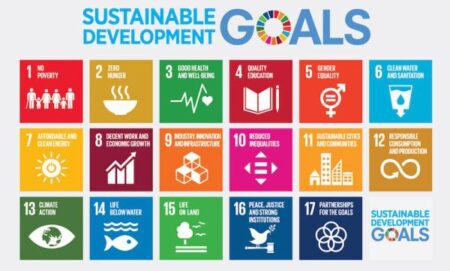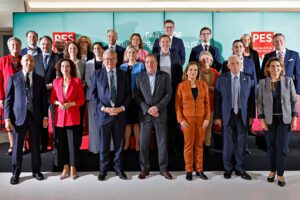A sustainable event can be defined as an event that is “designed, organized and developed in a way that minimizes potential negative environmental impacts, and leaves a legacy beneficial to the host community and everyone involved.”
The PES Council event aligns our sustainability commitments with those contained in Agenda 2030, which is why we have decided to take a step further and work toward the Certification of Sustainable Event.
Obtaining a certification involves the implementation of a working methodology and requirements that are subsequently audited. In this process, we have received the advice of Qalma, a consultant specializing in strategic management and sustainability, with whom we have created a multi-dysplastic team to design a Sustainable Plan, define requirements for the stakeholders of the event, Calculate the carbon footprint of the event and headquarter office, and have helped us to select projects to offset the carbon footprint obtained.
How is sustainability accessed?
The sustainability of our event is undergoing an assessment according to the Biosphere Sustainable Lifestyle Method. This means that the event will be tested for compliance with the 2030 Agenda for Sustainable Development to obtain the Biosphere Sustainable Lifestyle Method certificate. This certificate is granted through RTI, an international NGO entitled to certificate events.
The evaluation of the SDGs in the design and development of our event will enable us to put our commitments in the field of environment, society and the economy in practice, thus demonstrating our alignment with the Agenda 2030.
The overall evaluation of the SDGs took into account the following examples of commitments from the service providers involved in the event, as evidenced in actions:
1. Environment and Climate Change
- Investing in the infrastructure and equipment in order to reduce water consumption.
- Using rainwater for green areas.
- Using 100% green electricity from sustainable sources.
- Investing in the infrastructure for smart buildings.
- Monitoring and reducing the digital energy consumption.
- Calculating the carbon footprint.
- Limiting the consumption of cleaning products and water.
- Using ecological cleaning products and avoiding chemicals wherever possible.
- Aiming for a zero plastic single usage.
2. Society and Culture
- Respecting the local communities of our environment and sharing their culture and history in a respectful way.
- Developing sanitary and safety guidelines.
- Contributing to community supporting creative projects.
- Supplying electricity for mobile showers and laundry for homeless people.
3. Governance and Economy
- Supporting a system of economic and resource governance and management in an honest and transparent manner.
- Encouraging visitors to discover the city, its food and culture.
- Promoting the use of new technologies to avoid travel in vehicles.
- Creating quality local employment.
- Facilitate the exchange of good practices and knowledge in the company.
- Encouraging good practices to prevent food waste.
Carbon footprint calculation
A carbon footprint is the amount of greenhouse gases human activities release into the atmosphere by an individual or specific group, event, or a product. The carbon footprint of an event measures the CO2 emissions we emit and, therefore, the impact that the design and development of the event has on our planet and on climate change.
We are measuring the carbon footprint of our event under the standard ISO 14064, scopes 1 and 2. A carbon footprint measures the total greenhouse gas emissions caused directly and indirectly by an event. The total carbon footprint of the PES Council event is very low, amounting to 1.97 TnCO2e.
How we are compensating for the CO2 emissions resulting from the PES Council event
To offset the carbon footprint created by the PES event, we will contribute to the Forest Restoration Project in the Natural Reserve “Valle de Iruelas” in Ávila (Spain), with Bosques Sostenibles, specialized in CSR initiatives in the Environment.
The objective of the project is the restoration of burnt area in 2019 that affected native masses of high value, for the recovery of the forest and the conservation of habitats and soil.
As mentioned above, our carbon footprint for this event is extremely low, which would mean only eight trees needing to be planted in order for us to offset our emissions. However, we want to take our commitment to sustainability a step further, which is why we will be supporting the plantation of 500 trees with this project.
This year, participation is strictly limited due to the Covid-19 pandemic, as we are complying with government regulations in order to keep everyone safe.
Many of our regular participants are not able to attend because of the health situation, although they are following our event from home. In total, for a PES Council meeting, we would in normal circumstances host our delegates (166 delegates who usually attend and vote, plus an additional 160 delegates), activists and staff, and other organisations, which bring us to the usual 500 people. This year the majority of our participants will be following the event online.
Our commitment with sustainability leads us to offset the footprint for everyone. These 500 trees represent the number of participants we usually have at PES Council meetings. This is an additional step we want to take to lead the way towards more sustainability and to incorporate climate actions into our work.
Why do we care about the sustainability of the PES Council event?
As the Party of European Socialists, we are committed to pushing for ambitious climate policies to fight climate change, protect our environment against further degradation and safeguard the wellbeing of present and future generations. We support the implementation of the European Green Deal and its initiatives and we want to see changes that will bring climate justice and more social fairness across Europe and beyond.
By ensuring that the CO2 emissions arising from the PES Council event are offset and that our event is sustainable, we want to lead by example and show that the policies we support are also policies we implement to create a truly more sustainable society. Sustainability is one of the main pillars of our policies, and we will continue showing this through our actions.



